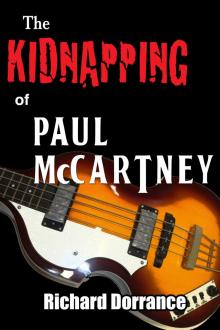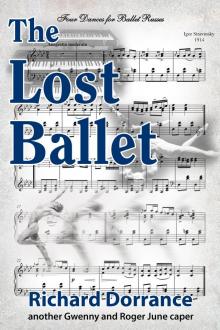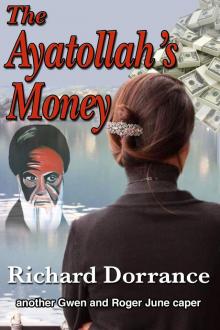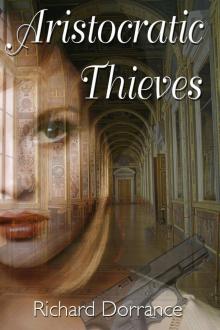- Home
- Richard Dorrance
The Lost Ballet Page 2
The Lost Ballet Read online
Page 2
Chapter 2 – The Composer and The Impresario
Helstof showed them the papers they had found in the secret compartment. She made everyone sit down, explained about the two letters and the two newspaper articles from 1914, and passed them around. She said to the four former dancers, “I guess you know who Stravinsky and Diaghilev were?” They did. She looked at Roger and Gwen, who nodded, yes. Helstof picked up a letter and unfolded the single sheet of paper. She looked at the Russian script, and read aloud:
Dear Sergei:
The days are warmer here in Petersburg than when I left Switzerland two months ago. It is pleasant, but I don’t fancy spending another winter here…..ever. I long to get back to Lausanne to see the little boy and the baby.
I spend my days here in the main city library, and at the Hermitage. I have found some interesting material that will help me with Les Noces, but I think I will have to make up much of that story as I go along. I am used to doing that after the last six months, working on the ballet. I could not warm myself to the story you proposed for the ballet, as I am sick of thinking about old Russian gods running around the forests, making life miserable for everyone. So I wrote the score based on some paintings I saw recently in Lausanne by some Frenchmen. They are wild, and that matches my mood over the last six months.
When I am bored reading in the libraries, I take out the ballet score and sing it in my head. I am not sure the music is any good, and that may be because I don’t understand the paintings. But they consume me.
I must get back to Lausanne soon. Katerina is poorly.
Yours most fondly, IS
Petersburg, July 1914
Henric opened the flap of one envelope and extracted two articles, cut from a newspaper. He said, “They’re from a French newspaper,” and handed them to his wife, whose mother was French. The two articles were from Le Monde, one dated August 1913 and one dated September 1913. Helstof said, “They are reviews of a performance by the Ballets Russes, in Paris in August 1913. It was The Rite of Spring, by Stravinsky. One is about the music, and one is about the choreography. The person who wrote the article about the music hated it. The person who wrote about the choreography and the dancing loved it.”
She set the articles on the table and translated the second letter.
1914, January the 13th, My Dear Friend Igor,
In another post I have sent two more reviews of Rite. The one man is a fool, who wouldn’t know great music if God himself stuck a celestial trumpet in the man’s ear and blew a choir written by angels. The other man also is a fool for praising Bakst for the movements. When it comes time to do Les Noces, I will get someone else who understands the direction you are heading in your musical phantasies, and will not choreograph so as to make all the dancers seem to be in straightjackets and from the lunatic asylum.
I have paid off almost all the debts from the Rite production, and soon shall send you funds. We did well on this, and will do better on the next.
If you cannot come to Paris to discuss the next dance, I will come to Lausanne. We must speak. We must continue this work. No one can write dance songs the way you will, and I have people who will give us the money to make the productions. You will have as great and large of an orchestra as you want and need. I promise you this, my great friend, and any dancer you want. They all want to fly to your music.
Do you still mean to go back to Petersburg? Are things there not very unsettled, dangerous even? The damned Bolsheviks are trouble-makers, and they are serious. Can you not come to Paris and do the research?
Please write to me soon and tell me about the new music. It will be wonderful. I await your next work.
Diaghilev
Helstof picked up printouts from Wikipedia articles on Diaghilev and Stravinsky. At the end of both articles were lists of works, which showed that Stravinsky and Diaghilev had collaborated on the following ballets:
The Firebird, 1910
Petrushka, 1911
The Rite of Spring, 1913
Pulcinella, 1920
Les Noces, 1923
Helstof looked at the others and said, “Nothing from the time period of Stravinsky’s letter that we have here, 1914. Nothing between 1913 and 1920. But in the letter it says he has written another ballet, and he’s not sure he likes it. But he says he takes it out when he’s bored, and sings it in his head.” She paused. “Why is it not on the encyclopedia list of articles? Where is it? What’s it called?”

 The Kidnapping of Paul McCartney
The Kidnapping of Paul McCartney The Lost Ballet
The Lost Ballet The Ayatollah's Money
The Ayatollah's Money Gwenny June
Gwenny June Aristocratic Thieves
Aristocratic Thieves Gwenny June's Tommy Crown Affair
Gwenny June's Tommy Crown Affair